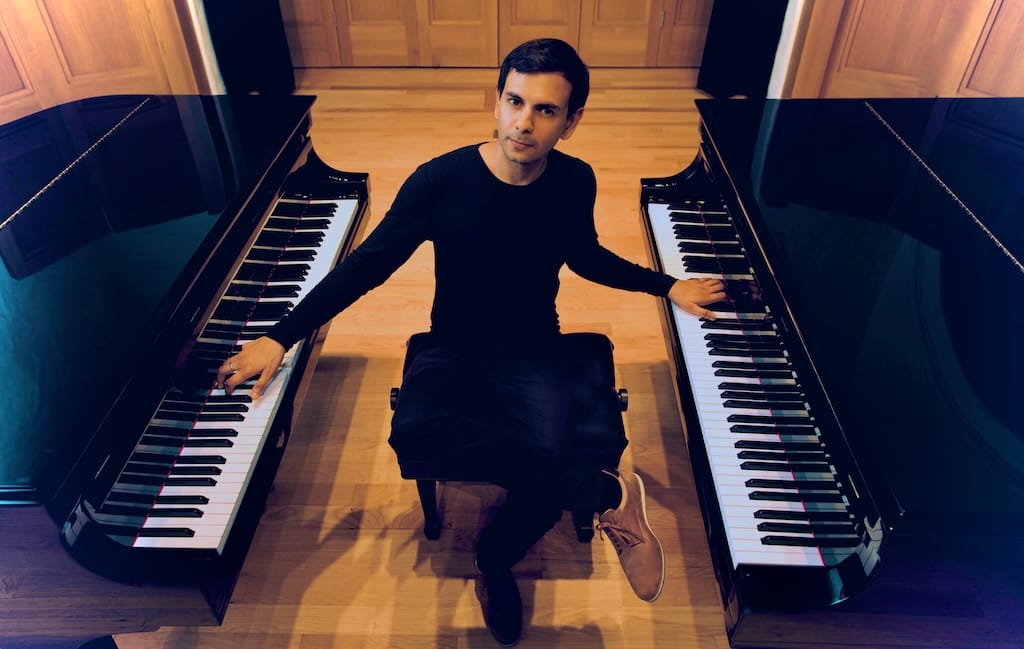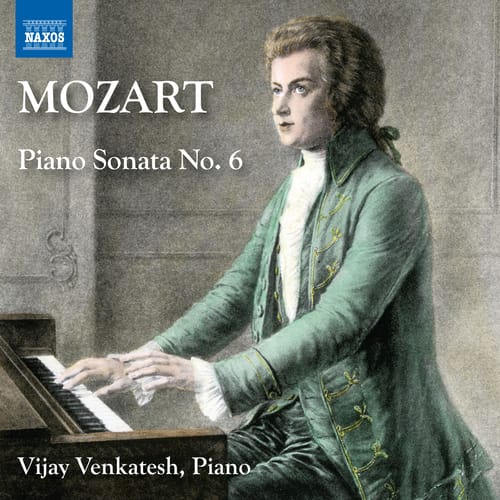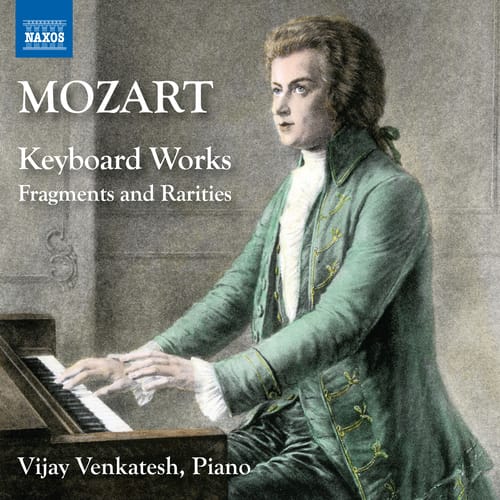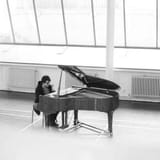Vijay Venkatesh on Mozart, Humanity, and the Art of Pure Sound
Pianist Vijay Venkatesh reflects on the spiritual discipline behind Mozart’s music, his new Naxos recordings, and how exploring the composer’s humanity has shaped his own search for purity of sound and artistic stillness.

There is an unmistakable sense of quiet intensity when pianist Vijay Venkatesh speaks about Mozart. Known for performances celebrated for both their poetic refinement and fearless virtuosity, Venkatesh has built a reputation as an artist who approaches music not simply as sound, but as a deeply personal act of inquiry. His 2024-25 season spans major concerto appearances across the United States and an active chamber music profile, yet it is his latest recording project that marks a particularly meaningful milestone.
Venkatesh’s new releases on Naxos, Mozart: Piano Sonata No. 6 and Mozart: Keyboard Works - Fragments and Rarities, reveal a side of Mozart rarely heard: incomplete sketches, early miniatures, and intimate pieces that illuminate the private landscape of a composer more often mythologised than understood. Recorded at the Colburn School under the guidance of his longtime mentor Fabio Bidini, the albums trace a journey not just through Mozart’s evolution, but through Venkatesh’s own search for purity of sound and artistic stillness.
In this conversation, he reflects on the spiritual discipline required to play Mozart, the vulnerability of recording fragments that expose the composer’s humanity, and the artistic philosophy guiding him forward.


Nikhil Sardana: Your upcoming Naxos albums bring together Mozart’s fragments, rarities, and the Piano Sonata No. 6, works that span the full arc of his life. What drew you to explore this lesser-known side of Mozart’s keyboard writing, and how did you approach shaping a narrative around these pieces?
Vijay Venkatesh: What drew me to these lesser-known sides of Mozart’s keyboard writing was the sense of encountering him not as a monument, but as a human being. Much of Mozart’s repertoire exists in this polished, almost transcendent realm, yet these fragments and rarities feel like windows into his private creative soul, places where he is thinking aloud, sketching possibilities, even dreaming.
As I started to live with these pieces, I felt almost as if I were tracing Mozart’s spiritual life, his youthful innocence, his exuberant imagination, and ultimately, his profound serenity. When assembling the album, I found a story that mirrors my own artistic path, this interplay between vulnerability and vision, between the unfinished and the fully realised.
In a way, recording these works became an inner pilgrimage for me. It allowed me to step closer to Mozart not just through his genius, but through his humanity.
NS: You’ve said that Mozart’s music represents “purity of sound” and an “egoless perfection.” How do you translate that idea into your playing, especially when working in the recording studio where every detail is magnified?
VV: The older I get, the more I realise that purity of sound is an act of devotion, almost like prayer. When I say Mozart requires “egoless perfection,” I don’t mean flawlessness, I mean becoming transparent enough for the music to shine through, unburdened.
In the recording studio, where silence is profound and the microphone is unblinking, that vulnerability becomes even more pronounced. I have to constantly release the impulse to “do more” or “prove something.” Mozart teaches me to quiet the internal noise, to breathe, to let my hands follow the natural arc of a phrase without tension.
When I reach that state of inward stillness, the sound becomes something alive, gentle, lucid, suspended. I feel as if I’m not playing at the music, but inside it. That, to me, is what Mozart meant by purity, not perfection, but presence.
NS: In your note, you mention being fascinated by the contrast between Mozart’s music and his personality, divine balance versus human imperfection. How does that dichotomy resonate with you personally as an artist?
VV: What moves me most about Mozart is precisely that contradiction. His music is so balanced, so luminous, so celestial, and yet his life was chaotic, impulsive, messy, achingly human. In that tension, I see my own journey reflected.
As artists, we often live between two worlds, our inner striving for beauty and meaning, and the imperfections, insecurities, and emotions that shape us. I feel that constantly as a pianist, the desire to reach for something beyond myself while honouring the truth of who I am today, flawed and evolving.
Mozart reminds me that imperfection doesn’t diminish beauty, it deepens it. His divine equilibrium isn’t the absence of chaos, but the transformation of it. In playing his music, I try to embrace my whole self, the part that seeks transcendence and the part that is still learning, still stumbling, still human.
NS: The album was recorded under the guidance of your mentor, Fabio Bidini, at the Colburn School. What was that collaborative process like, and how did his perspective shape your interpretation or sound palette for Mozart?
VV: Working with Fabio Bidini has been one of the great blessings of my life. He has shaped not just my musicianship, but my understanding of what it means to be an artist. Fabio guides with a kind of spiritual sensitivity, he hears the emotional truth behind a phrase, the intention behind a silence.
During the recording sessions, he never tried to mould me into something else. Instead, he led me toward a sound world that felt more inward, more transparent, more honest. He helped me strip away anything extraneous, technical tension, expressive habits, even interpretive ego, so that the music could breathe more naturally.
Some of our best insights came in the quiet moments between takes, discussing colour, articulation, or the way a phrase should float. Those conversations changed the way I think about sound itself.
NS: You’ve performed some of the most demanding concertos in the repertoire, including Rachmaninoff, Grieg, and Gershwin, and now you turn to Mozart, who requires a very different kind of virtuosity. What are the unique challenges of performing Mozart compared to these Romantic or modern composers?
VV: I’ve always loved performing composers like Rachmaninoff, Grieg, and Gershwin, their emotional expansiveness, their sonic richness. With them, the piano becomes an ocean. With Mozart, the piano becomes a mirror.
His music demands pristine clarity. Every articulation, every ornament, every breath between notes carries meaning. One imbalance, one overly forceful gesture, and the entire illusion of weightlessness collapses. It’s a different kind of virtuosity, one that reveals rather than dazzles.
For me, the challenge is cultivating a simplicity that is never simplistic, a lightness that still contains depth. It’s the kind of playing that requires emotional honesty. You cannot hide behind sound. Mozart shows you to yourself.
NS: Naxos has a long legacy of introducing both emerging and established artists to global audiences. How does it feel to be part of that tradition, and what does this release mean for you at this point in your career?
VV: Joining the Naxos family feels like entering a lineage of artists who have shaped the musical world in profound and lasting ways. It’s a label that values exploration, curiosity, and sincerity, qualities that resonate deeply with me.
This release comes at a moment in my career when I feel more grounded than ever in who I am as an artist. To share Mozart in this intimate, personal form is a milestone for me. I’m humbled that this album will reach listeners around the world, perhaps even touching someone the way Mozart has touched me.
NS: You’ve built an exciting career as a soloist and chamber musician, performing across continents. How has your experience collaborating with orchestras and ensembles influenced the way you approach solo repertoire like this?
VV: Collaboration has been one of the most formative aspects of my life. When you perform with orchestras or chamber partners, you learn to listen beyond yourself, to trust, to yield, to breathe with another human being. Those experiences shape my solo playing profoundly.
When I approach solo repertoire, I think in terms of dialogue rather than monologue. I imagine the piano not as a single voice but as a constellation of voices, conversing, teasing, consoling, questioning. The silences become just as meaningful as the notes.
I think that’s why Mozart feels so intimate to me. Even when I’m alone at the instrument, I feel accompanied by him and his musical spirit.
NS: Looking ahead, are there other composers or projects that inspire you in a similar way to this Mozart journey? Perhaps works that balance technical brilliance with philosophical or emotional depth?
VV: I’m always drawn to composers whose music carries both emotional and spiritual resonance. Schubert remains a world I continually return to, his vulnerability, his quiet transcendence. Beethoven speaks to my fascination with colour, profundity, and the sacred. Brahms feels like an inner cathedral of melancholy and feeling.
I’m also intrigued by exploring connections between Western classical music and the philosophical traditions of my own Indian heritage, the idea of sound as vibration, resonance, mantra, meditation. There is a universe in that intersection that I feel called to explore.
Ultimately, I seek projects that ask something of the soul, music that doesn’t just display technique, but opens a door to reflection, wonder, and interior stillness.





